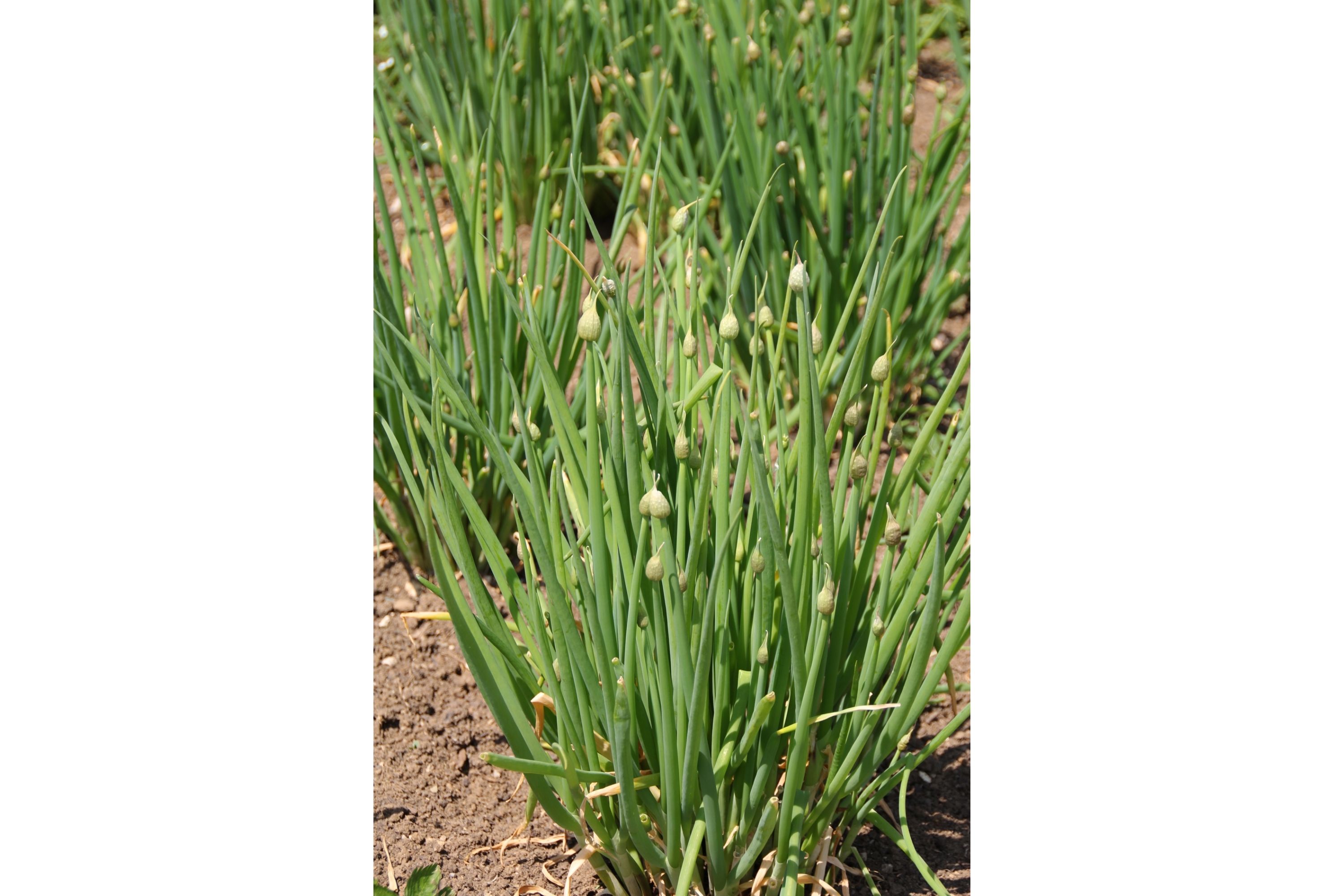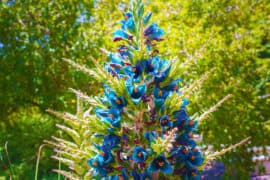Welsh onion
(Allium fistulosum)

Description
Allium fistulosum, commonly known as Welsh onion, is a versatile and flavorful perennial plant belonging to the Allium genus. Native to Asia, this onion species has gained popularity worldwide due to its culinary uses, ornamental value, and health benefits. With its slender, hollow leaves and mild onion-like taste, Allium fistulosum has become a staple ingredient in various cuisines and an excellent addition to home gardens. In this article, we will explore the various aspects of Allium fistulosum, including its taxonomy, characteristics, cultivation, culinary uses, and medicinal properties. Taxonomy Allium fistulosum belongs to the Plantae kingdom, Angiosperms clade, and Monocots class. It falls under the Asparagales order and Amaryllidaceae family. The genus Allium encompasses over 800 species, including garlic, chives, and shallots. Allium fistulosum is commonly referred to as Welsh onion, green onion, bunching onion, or Japanese bunching onion. Characteristics The physical appearance of Allium fistulosum, or Welsh onion, can be described as follows: Leaves: The leaves of Allium fistulosum are long, slender, and hollow. They are typically dark green in color and grow in clusters. The leaves emerge from a bulbous base and can reach a length of around 12-18 inches (30-45 cm). They have a tubular shape and a grass-like appearance. Stems: The stems of Welsh onions are also hollow and upright. They are typically green and can grow to a height of approximately 20-30 inches (50-75 cm). The stems provide support to the leaves and flowers. Flowers: In late spring or early summer, Allium fistulosum produces spherical, umbel-like clusters of small flowers on long scapes. The flowers can be white or pale purple in color. Each umbel consists of numerous individual flowers, creating a visually appealing display. Bulbs: Welsh onions have small, elongated bulbs that are typically not as large or round as those of common onions. The bulbs grow at the base of the plant and are covered by layers of papery, thin skin. While the leaves and stems are the primary edible parts of Allium fistulosum, the bulbs can also be consumed and have a milder flavor compared to common onions. Overall, the physical appearance of Allium fistulosum is characterized by its long, hollow leaves, upright stems, clusters of small flowers, and small bulbs. These features contribute to its ornamental value and distinguish it from other onion species. Habitat and Range Allium fistulosum, or Welsh onion, is native to Asia and has a wide range of distribution. It is found in various countries across the continent. Here are some details about its habitat and range: Habitat: Allium fistulosum is a hardy plant that can adapt to different environmental conditions. It thrives in temperate climates and is commonly found in regions with cool to mild temperatures. It prefers areas with well-drained soil and adequate sunlight but can tolerate partial shade. Welsh onions can be cultivated both in open fields and in home gardens. Range: Allium fistulosum has been cultivated and naturalized in many parts of the world due to its culinary uses and ornamental value. Its range extends beyond its native Asia to other continents. The specific countries and regions where Allium fistulosum can be found include: Asia: Welsh onions are native to Asia and are widely grown in countries such as China, Japan, Korea, Mongolia, and parts of Siberia. They have been cultivated in these regions for centuries and are an integral part of the local cuisine. Europe: Allium fistulosum has been introduced and naturalized in various European countries. It is cultivated and commonly found in countries like the United Kingdom, Germany, France, Russia, and others. North America: Welsh onions have also been introduced and naturalized in North America. They are grown and cultivated in countries such as the United States and Canada. In the United States, they are particularly popular in regions with temperate climates, such as the Pacific Northwest and parts of the Midwest. Other Regions: Allium fistulosum is cultivated in many other parts of the world. It can be found in countries like Australia, New Zealand, South Africa, and South America. Due to its adaptability and popularity as a culinary ingredient, Allium fistulosum has spread beyond its native range and is now cultivated in numerous regions worldwide. Its versatility and ability to thrive in various climates have contributed to its global presence. Culinary Properties: Flavor: Welsh onions have a milder and sweeter taste compared to common onions. The flavor is often described as a combination of onion and garlic. Edible Parts: The leaves and bulbs of Allium fistulosum are both edible. The leaves are commonly used as a fresh herb, while the bulbs can be consumed raw or cooked. Cultivation: Climate Requirements Temperature: Allium fistulosum thrives in temperate climates with cool to mild temperatures, ranging between 50-75°F (10-24°C). Sunlight: It prefers full sun exposure but can tolerate partial shade. Soil Requirements: Well-Drained Soil: Welsh onions prefer fertile, well-drained soil. Sandy loam or loamy soil with a pH range of 6.0-7.5 is ideal for their growth. Organic Matter: Incorporating organic matter like compost or well-rotted manure improves soil fertility and moisture retention. Propagation: Seeds: Allium fistulosum can be propagated from seeds. Sow the seeds in early spring or late summer, approximately ¼ to ½ inch (6-13 mm) deep, with a spacing of 1 inch (2.5 cm) between seeds. Division: Mature clumps can be divided by carefully separating the bulbs and replanting them. Care and Maintenance: Watering: Provide regular watering to keep the soil consistently moist but not waterlogged. Weed Control: Regular weeding is essential to prevent competition for nutrients and space. Fertilization: Apply a balanced organic fertilizer during the growing season to support healthy plant growth. Culinary Uses: Allium fistulosum is a versatile ingredient that adds a distinctive flavor to a wide range of dishes. Here are some popular culinary uses of Welsh onions: Fresh Herb: The green leaves of Allium fistulosum are commonly used as a garnish, in salads, or as a flavorful addition to soups, stir fries, and various Asian cuisines. The leaves can be chopped finely or used whole to add a mild onion-like taste and a fresh, green aroma to the dishes. Stir-Fries and Sautéed Dishes: Welsh onions are often stir-fried or sautéed with other vegetables or proteins. The tender green leaves and white stalks provide a pleasant crunch and impart a delicate flavor to the dish. Pickling: The bulbs of Allium fistulosum can be pickled, providing a tangy and slightly sweet addition to salads, sandwiches, and appetizers. Pickled Welsh onions are popular in Korean cuisine, where they are known as "maneul jangajji." Infused Oils and Vinegars: Welsh onion can be used to infuse oils or vinegars, creating flavorful bases for dressings, marinades, or dipping sauces. Allium Substitute: In recipes where a milder onion flavor is desired, Welsh onions can be used as a substitute for common onions or scallions. Medicinal Properties: In addition to its culinary uses, Allium fistulosum possesses several health benefits due to its nutrient content and medicinal properties: Antioxidant Effects: Welsh onions contain various antioxidants, such as flavonoids and phenolic compounds, which help neutralize harmful free radicals in the body, reducing the risk of chronic diseases. Immune-Boosting Properties: The high content of vitamin C in Welsh onions helps strengthen the immune system and promotes overall health. Digestive Health: Welsh onions contain dietary fiber, which aids in digestion, promotes bowel regularity, and supports a healthy gut. Anti-inflammatory Effects: Some studies suggest that the sulfur compounds found in Allium fistulosum may possess anti-inflammatory properties, potentially providing relief from inflammatory conditions. Cardiovascular Health: Consumption of Welsh onions has been linked to improved cardiovascular health. They may help lower blood pressure, reduce cholesterol levels, and prevent the formation of blood clots. Conclusion: Allium fistulosum, or Welsh onion, is a versatile plant known for its culinary uses, ornamental value, and health benefits. With its mild onion flavor and attractive appearance, it has become a popular ingredient in various cuisines worldwide. Whether used as a fresh herb, stir-fried vegetable, or pickled condiment, Welsh onions add a unique touch to dishes while providing essential nutrients. Moreover, their potential health benefits make them a valuable addition to a balanced diet. So, consider cultivating Allium fistulosum in your garden or incorporating it into your culinary repertoire to enjoy its delightful flavors and wellness-promoting properties.
Taxonomic tree:







